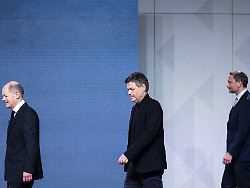Tuesday, December 7th, 2021
First working date of the traffic light
There is already a crunch in foreign policy
From Sebastian Huld
The coalition agreement has been signed, and for the first time the heads of the upcoming government appear on foreign territory: at the federal press conference it turns out surprisingly quickly that there is still a lot of need for coordination in terms of foreign policy.
It is only a short walk from the future back to the present for the traffic light coalition. After the lively, cheerful ceremony of signing the coalition agreement in a house called the Futurium, the Federal Chancellor-designate Olaf Scholz, his Vice-Chancellor Robert Habeck and his deputy Christian Lindner appear on Tuesday in the neighboring house of the Federal Press Conference. And immediately the whole complexity of the world collapses over the coming government heads: China, the conflict in Russia, compulsory vaccination and the financing of the traffic light projects. The government representatives may feel the spirit of optimism, but for the capital city press it goes on and on. And so the first traffic light appointment without a show factor and opportunities for self-presentation shows how quickly the parties reach the limits of their mutuality.
The very first topic, China, makes it clear that foreign policy between the parties threatens to become a regularly recurring subject of controversy; especially between the SPD and the Greens. Scholz is asked three times whether Berlin would follow the US example and not send diplomatic representatives to the Winter Olympics in Beijing to protest against the human rights policy of the Communist Party. Scholz answers three times, but not to this question. He praised US President Joe Biden for the importance of human rights. He declares that the coming federal government will seek common answers, both European and transatlantic. He lectures in the best Helmut Schmidt manner about the emergence of new, important states in the world.
It’s about cooperation. “That’s why we have to manage to know about the differences and see that we get along well in the world,” said Scholz on his last day as Executive Vice Chancellor. That doesn’t sound like an ambitious human rights policy or even a tightened pace towards Beijing. It fits that Scholz, according to “Wirtschaftswoche”, informed the Chinese leadership weeks ago that he did not intend to change the China course of his predecessor Angela Merkel. When asked about this, Scholz is clueless.
Baerbock has already caused a protest from Beijing
One thing is clear: it would be an affront to the upcoming Federal Foreign Minister Annalena Baerbock. With the approval of the FDP, their party had stipulated in the coalition agreement that German foreign policy would in future be more oriented towards ethical principles in dealing with China and Russia. In a “taz” interview at the weekend, Baerbock had explicitly not ruled out boycott instruments against the Olympic Games and promptly sparked protests from Beijing. The upcoming chancellor and his foreign minister still have many clarifying talks ahead of them.
That doesn’t mean that Scholz is ruling out more pressure on China. It is said, however, that Scholz first wants to coordinate within the EU and with the USA before going public with a decision. His government will consult carefully and not clarify this at press conferences, says Scholz. “You won’t get to know the style from us.” Only a few minutes later, Habeck speaks about his dissenting position on the Ukraine conflict.
It is his “unchanged personal opinion” that he does not understand that Ukraine’s support in the conflict with Russia is limited to medical aid for the victims of the clashes. In the spring of a visit to Ukraine, Habeck demanded that the country be given “defensive weapons”. He was particularly interested in ways to defend against drones and mines, but the uncoordinated demand was criticized at the time. The previous federal government had taken great care not to become a party in the conflict in eastern Ukraine. That also seems to continue to be Scholz’s line.
Especially since the SPD, unlike the Greens, wants to put the Nord Stream 2 gas pipeline into operation, which is arousing fears in the Ukraine and the Eastern EU states that Moscow will be more blackmailed. Since the USA is currently increasing the pressure on Berlin to block the pipeline to show the Kremlin its limits, this internal traffic light dispute is also gaining in importance. Scholz can hardly rely on the coalition partners complying with his rule of strictly resolving disputes internally. The junior partners are under too much pressure to show their own party and voters that they are fighting for their positions. The magic of the beginning could evaporate very quickly.
